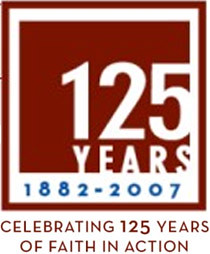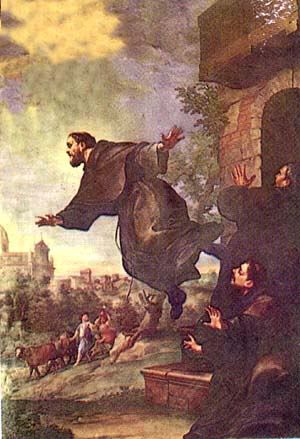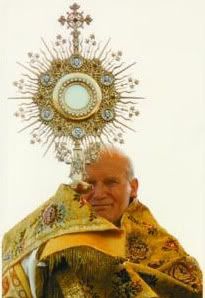St. John Baptiste de la Salle
 Today is the feast of St. John Baptiste de la Salle, priest and religious founder.
Today is the feast of St. John Baptiste de la Salle, priest and religious founder.St. John was born at Rheims on April 30, 1651, and died on this date in 1719. Eschewing the traditional family profession of law, he decided to enter the Church's service, and received the tonsure in 1662. His uncle was canon of Rheims, and he resigned this post in favor of young John in 1667. In seminary he attracted the attention and friendship of Nicolas Roland, himself a canon of Rheims, theologian, and religious founder. He was ordained in 1678, and dedicated himself assiduously to the Mass and the sacraments.
In the years following his ordination, St. John Baptiste de la Salle was occupied in the work of executing his friend Nicolas's will. Nicolas and founded a religious community of women for the education of young girls: the Sisters of the Child Jesus. He entrusted them to St. John Baptiste de la Salle, who dedicated much effort to their work and to the opening of several free schools in the late 1670s.
He spent large quantities of time visiting the teachers each day, and also worked to encourage them and aid them in their own studies. Since the schools were free, the conditions they afforded to the instructors were poor, and St. John Baptiste de la Salle used his sizeable resources as a canon and head of a wealthy family (John Baptiste was the eldest child and his parents had died while he was in seminary) to provide room and board to those unable to do so themselves.
St. John Baptiste de la Salle resigned his canonry in 1683, and subsequently divested himself of his fortune, using it to distribute bread to the poor during a famine at that time. This he did after considerable prayerful consideration and the advice of one of his closest advisers. Henceforth, his undertakings would depend upon Providence. Seeing the deficiencies of a purely secular approach to operating free educational institutions, he sought to organize his group of teachers into a religious society. They took the name of the Institute of the Brothers of the Christian Schools. A rule was drawn, and the novices took the vows of obedience, chastity, and poverty, as well as a fourth vow to dedicate themselves to the teaching of the poor. The brothers were not ordained, and the rule specified that no priest should join the order. This final determination followed the sudden illness and death, while at seminary, of the order's most brilliant and promising member, who St. John Baptiste de la Salle intended to succeed him as superior.
However, in 1692, when the first vows were professed, the order had been so weakened by death and desertion that only two brothers took them. The 1690s were a time of hard work and consolidation, but the early years of the 1700s were very difficult, as St. John Baptiste de la Salle struggled with Jansenists, as well as with the French hierarchy, who viewed his un-clerical religious institute as suspect. The founding of schools for the poor was also accompanied by the founding of a school for the brothers themselves to facilitate their teaching and compensate for their not attending seminary. Schools were also opened for Irish and English exiles, "troublesome" boys, and schools for prospective artisans.
In 1716 he convoked a general chapter that elected a new superior general. St. John Baptiste de la Salle feared the order being too dependent on him, and sought the election of a new superior to solidify the Brothers' work. From thence forth he lived as a simple brother, dedicated himself to teaching pupils and novices. 
St. John Baptiste de la Salle combined practical innovation with a dedication to cultivating the spiritual life of students. He popularized the practice of dividing schools into grades and emphasized the necessity of giving instruction in the vernacular language (primary education consisting primarily of Latin at the time -- a knowledge of little use to the poor students in the Brothers' schools). He also recognized the importance of reminding students of the presence of God in our lives -- thus, each class is begun with prayer, each prayer with the exhortation, "Let us remember that we are in the holy presence of God." Each prayer is concluded with the request, "Live, Jesus, in our hearts forever."
Today the Christian Brothers have schools on 6 continents (including my high school). St. John Baptiste de la Salle was declared the patron of teachers in 1950. No, that's not St. John Baptiste de la Salle at the right, that's Br. Joel.
St. John Baptiste de la Salle, pray for us.
Live, Jesus, in our hearts, forever.
File Under: Saints








0 Comments:
Post a Comment
<< Home